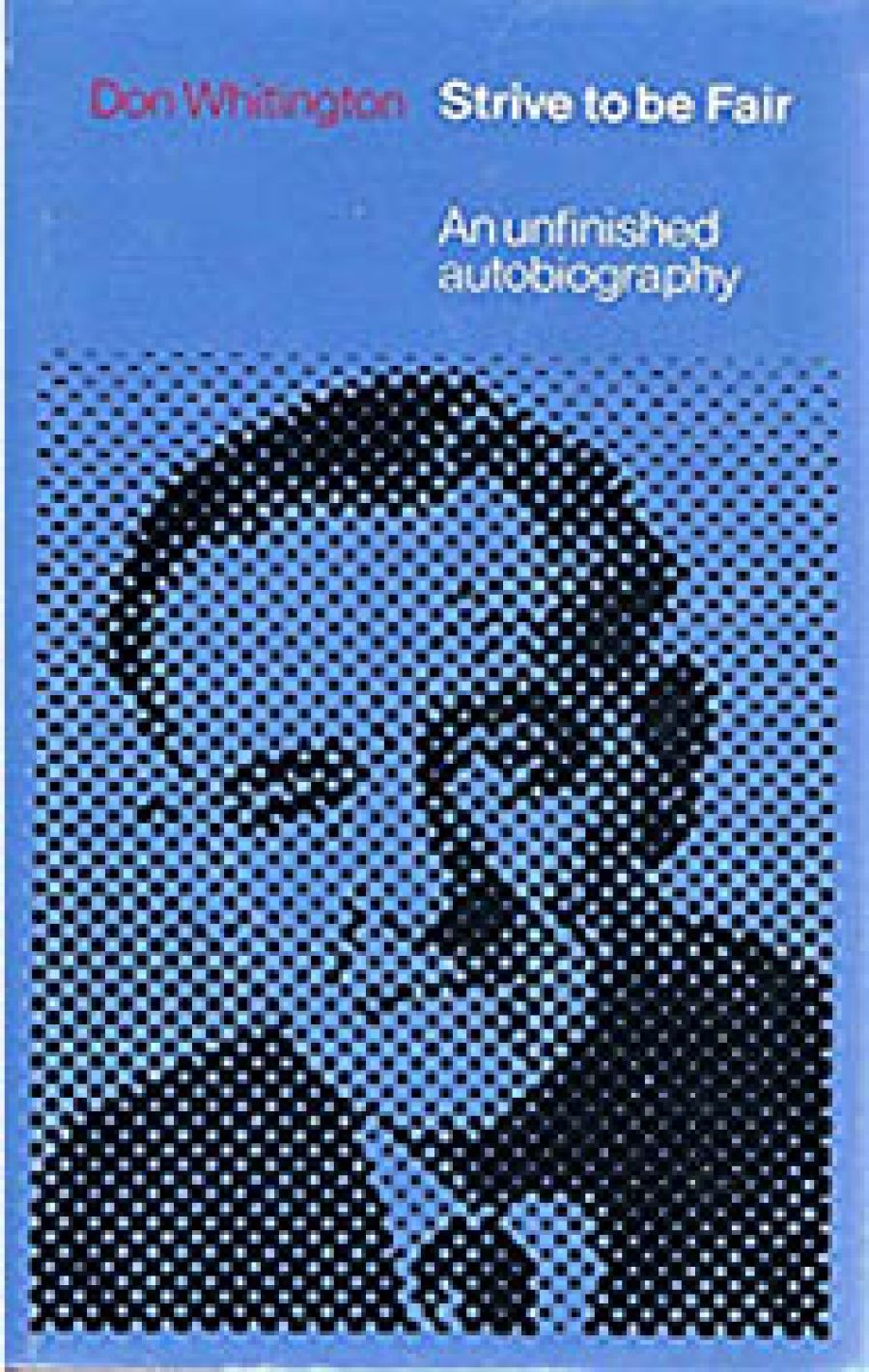
- Free Article: No
- Contents Category: Memoir
- Review Article: Yes
- Online Only: No
- Custom Highlight Text:
Don Whitington became a journalist seven years before I was born, and moved to Canberra for the first time shortly before the Japanese bombed Pearl Harbor. He died last year, after a tragically bungled series of surgical operations, before he was able to complete his autobiography, Strive to be Fair.
The title is taken from a remark one of the many editors for whom he worked made: ‘There is no such thing as a good objective journalist. If you are not sensitive enough to feel for your subject, to have a point of view, to suffer joy or agony or sympathy about a story you are covering, you will never be a good journalist. Don’t strive to be objective. Strive to be fair.’
- Book 1 Title: Strive to be Fair
- Book 1 Biblio: ANU Press, $7.95, 170pp
The man who gave Whitington this eminently sound advice was Sid Deamer, and it is perhaps ironic that one of the few people besides Whitington himself who took it was Sid’s son, Adrian, who many years later edited Rupert Murdoch’s The Australian during the brief period that paper was both reasonably good and reasonably fair.
But certainly Whitington himself never forgot it, and whatever criticisms could be made of Whito (as he became known with various degrees of affection around the Canberra Press Gallery) lack of sympathy, a viewpoint and a sense of fairness were not among them. He was always a man deeply concerned with what he was writing, prepared to argue vehemently (if stutteringly) for what he thought was right, and equally prepared to listen with interest to the other side. He was also unfailingly courteous and helpful, especially towards younger journalists who were trying to find their feet in the tough and esoteric world of Canberra politics; a quality for which I, and many others, remember him perhaps more than for his writing.
It is easier for people of my generation to write about Don Whitington as a person than as a writer; his achievements revolved around the way he asserted his own independence, first as a man during the great depression, and later as a journalist who cut loose from the established chains (which he believed were dishonest in their ties to conservative economic and political groups) to set up Australia’s longest running newsletter – Inside Canberra – which thirty years out is still published weekly by one of his partners, Rob Chalmers. Another partner, with whom Whitington founded the Northern Territory News, was Eric White, who branched out to start Australia’s oldest and largest lobbying business.
During his career, Whitington encountered a great many politicians, and his autobiography makes firm, though usually kind (by today’s standards) judgments about them. He was fond of Arthur Fadden, and had a soft spot for Menzies; although, reading between the lines, there is more than a suggestion that Menzies deliberately cultivated him as a source of information. He made no secret of his admiration for John Curtin and Ben Chifley, and also for Gough Whitlam; and it is a pity that he died before his book reached the Whitlam years.
The later chapters are rushed, and at times degenerate into a sort of list of anecdotes about ‘Famous people I have met’ without the punch or the depth of the earlier ones, which are as good and moving an account of a working class boy growing up into, through, and out of the Depression as one could hope for. For people who don’t know the times, the book is a salutary lesson around the theme of life not being meant to be easy.
Even towards the end, where Whitington recounts an extraordinary scheme to run a clandestine cops and robbers venture to rescue Judith Todd, the daughter of the former Premier of Rhodesia, from the hands of Ian Smith in 1971, he was obviously not prepared to live comfortably when he thought high principles were at stake. The idea, involving Whitington in person, helicopters, fast planes, a former war correspondent (Pat Burgess) and the finances of Rupert Murdoch, was perhaps fortunately never put into effect; Ms Todd was released by the time the planning was finished. But to even conceive of it at the age of sixty suggests that the romantic streak in Whitington was a major part of his life.
This is also shown in the series of stories that studs the book, and produces some of its best moments (although unfortunately many of the best yarns were cut out of the final manuscript by order of the lawyers. The diligent reader may identify the gaps about people like Menzies, Sir Warwick Fairfax, and the amazing R.A.G. Henderson of the Fairfax organisation, and the anonymous references to Sir Richard Kirby and Clive Evatt, among others).
It is not, basically, a book about politics, but it is a book which illuminates some of the trials of being an Australian, and a journalist, during a time when things were starker, if less complicated, than they are now. Don Whitington, at the time of his death, was not ‘the best known and most experienced observer of the political scene in Australia’ as Gough Whitlam flatteringly described him in a ‘to whom it may concern’ letter, in 1974, he was one of the best, and most experienced, of socio-political observers. The tragedy is that his work was not known to more people, and that he did not have the time – or the acerbity – to conclude and polish up his apologia pro sua vita.


Comments powered by CComment